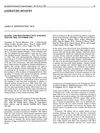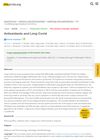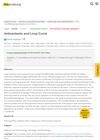 January 2018 in “Springer eBooks”
January 2018 in “Springer eBooks” Lasers are less favored for hair transplant surgery but show promise for hair growth in controlled trials.
 November 2017 in “Research Journal of Health Sciences”
November 2017 in “Research Journal of Health Sciences” Skin infections and eczema were most common in all ages, acne in teens and young adults, and nutritional skin problems and infestations in children.
 May 2017 in “American Society of Health-System Pharmacists eBooks”
May 2017 in “American Society of Health-System Pharmacists eBooks”  March 2017 in “Fundamental & Clinical Pharmacology”
March 2017 in “Fundamental & Clinical Pharmacology” The model and estimator can predict drug exposure in kidney transplant patients well.

Off-label drug use can be risky but sometimes beneficial when standard treatments fail.

Some vaccines, like the hepatitis B vaccine, might be linked to the hair loss condition Alopecia Areata, but more research is needed.
 January 2013 in “Dermatologic Clinics”
January 2013 in “Dermatologic Clinics” Hair disorders need a holistic approach, including medical, cosmetic, and psychological support.
 January 2012 in “Yearbook of Dermatology and Dermatologic Surgery”
January 2012 in “Yearbook of Dermatology and Dermatologic Surgery” Iron deficiency is not more common in women with hair loss, and neurogenic rosacea may need different treatment.
 June 2011 in “CRC Press eBooks”
June 2011 in “CRC Press eBooks” Low-Level Laser Therapy can stimulate healing and cell function, potentially leading to wider medical use.
 January 2009 in “Springer eBooks”
January 2009 in “Springer eBooks” The document concludes that treating skin conditions should include psychological care and a multidisciplinary approach is essential for effective management.
 March 1997 in “The American Journal of Cosmetic Surgery”
March 1997 in “The American Journal of Cosmetic Surgery” A new hair transplant method showed promising results and a study found how deep a CO₂ laser can penetrate skin.
 1 citations,
October 2022
1 citations,
October 2022 Antioxidants might help manage Long Covid by addressing oxidative stress and nutrient imbalances.
 1 citations,
October 2022
1 citations,
October 2022 The conclusion suggests that managing antioxidant levels and the calcium to magnesium ratio may help address Long Covid and related chronic fatigue conditions.
 4 citations,
January 2019 in “Dermatology Online Journal”
4 citations,
January 2019 in “Dermatology Online Journal” Low-dose naltrexone might be a cheap and effective additional treatment for hair loss with scalp discomfort due to its anti-inflammatory effects and few side effects.
 1 citations,
September 2023 in “AACE clinical case reports”
1 citations,
September 2023 in “AACE clinical case reports” Testosterone pellets might work for transgender men's hormone therapy, but more research is needed.
September 2021 in “Assay and drug development technologies” Drug repurposing shows promise for treating many medical conditions.
December 2007 in “Pediatrics in review” Some CAM therapies help with pediatric atopic dermatitis, but more research is needed.
4350 citations,
May 2012 in “Arthritis & Rheumatism” The new SLICC criteria for diagnosing lupus are more sensitive and accurate than the old criteria.
12 citations,
October 2016 in “Patient Preference and Adherence” Both patients and physicians are often dissatisfied with the control of systemic lupus erythematosus and lupus nephritis.
 9 citations,
March 2022 in “Antioxidants”
9 citations,
March 2022 in “Antioxidants” Synthetic antioxidants are effective, cheap, and stable, with some like zinc and cholecalciferol reducing child and cancer deaths, but the safety of additives like BHA, BHT, TBHQ, and PEG needs more research.
9 citations,
November 2021 in “PubMed” FDA-approved low-level light/laser therapy devices can significantly increase hair density in people with pattern hair loss.
9 citations,
August 2019 in “Lupus” Poor body image from pain can lead to more depression in lupus patients.
9 citations,
February 2018 in “Journal of Patient-Reported Outcomes” New tools were created to help lupus patients report their symptoms and impacts more accurately.
 7 citations,
April 2019 in “Aesthetic Surgery Journal”
7 citations,
April 2019 in “Aesthetic Surgery Journal” Repeated use of platelet-rich plasma in rats caused increased pain sensitivity.
 6 citations,
June 2022 in “Frontiers in Psychiatry”
6 citations,
June 2022 in “Frontiers in Psychiatry” Many patients with various medical conditions experience anxiety, which worsens their quality of life and raises healthcare costs.
 3 citations,
June 2023 in “Medicines”
3 citations,
June 2023 in “Medicines” Some antiseizure medications can cause reversible hair loss, with valproate, lamotrigine, and carbamazepine being the most common.
 3 citations,
April 2022 in “Clinical, Cosmetic and Investigational Dermatology”
3 citations,
April 2022 in “Clinical, Cosmetic and Investigational Dermatology” Different methods, including stress management, healthy diet, supplements, and treatments like minoxidil, can help hair grow back after COVID-19 related hair loss.
 3 citations,
April 2021 in “Cureus”
3 citations,
April 2021 in “Cureus” Low Vitamin D is common in people with Alopecia Areata, but its impact on the condition needs more research.
2 citations,
August 2022 in “Animals” Essential oils may improve dogs' health and melatonin can help with their sleep and anxiety, but both should be used carefully.
 2 citations,
August 2022 in “Reproductive Biology and Endocrinology”
2 citations,
August 2022 in “Reproductive Biology and Endocrinology” Magnesium supplements improved quality of life for women with polycystic ovary syndrome, but didn't help with acne, hair loss, or abnormal bleeding.






















